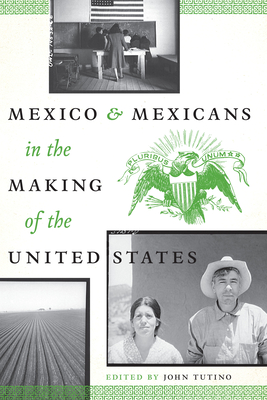

 University of Texas Press
University of Texas Press
Mexico and Mexicans in the Making of the United States


Key Metrics
- John Tutino
- University of Texas Press
- Paperback
- 9780292754300
- 9.02 X 5.98 X 0.75 inches
- 1.09 pounds
- History > United States - General
- English
 Secure Transaction
Secure TransactionBook Description
Mexico and Mexicans have been involved in every aspect of making the United States from colonial times until the present. Yet our shared history is a largely untold story, eclipsed by headlines about illegal immigration and the drug war. Placing Mexicans and Mexico in the center of American history, this volume elucidates how economic, social, and cultural legacies grounded in colonial New Spain shaped both Mexico and the United States, as well as how Mexican Americans have constructively participated in North American ways of production, politics, social relations, and cultural understandings.
Combining historical, sociological, and cultural perspectives, the contributors to this volume explore the following topics: the Hispanic foundations of North American capitalism; indigenous peoples' actions and adaptations to living between Mexico and the United States; U.S. literary constructions of a Mexican other during the U.S.-Mexican War and the Civil War; the Mexican cotton trade, which helped sustain the Confederacy during the Civil War; the transformation of the Arizona borderlands from a multiethnic Mexican frontier into an industrializing place of whites and Mexicans; the early-twentieth-century roles of indigenous Mexicans in organizing to demand rights for all workers; the rise of Mexican Americans to claim middle-class lives during and after World War II; and the persistence of a Mexican tradition of racial/ethnic mixing--mestizaje--as an alternative to the racial polarities so long at the center of American life.
Author Bio
I am a teacher and historian of Mexico in the context of the Americas and the World. I aim to understand the histories of popular communities as they engaged colonial rule and early capitalism, national states and industrial challenges, revolutionary promises and national development--and now the unprecedented uncertainties of globalization and explosive urbanism.
In the process, I search for ways to integrate studies of the environment, production, and state power with an emphasis on labor, ethnic, and gender relations, and on the cultural constructions that debate everything. In other words, I study Mexican communities seeking a more integrated history--and and I try to explore that history over the long run and in global context. To bring those perspectives into the classroom, for undergraduates I teach the historical foundations of Latin America, 1400-1800, as well as the history of Mexico, its revolutions, and its integrations with the United States.
With graduate students, my courses focus on exploring the diversity of the Americas as they engaged the world after 1500, and the History of Mexico and its diverse communities, rural and urban, from the colonial period through the present. I try to rethink with students at all levels the roots of global capitalism in the Americas before 1880, the transformations that marginalized Latin America in the industrial era after 1800, the experiments in national development after 1910, and the coming of globalization.
My emphasis is not just that global powers have shaped communities across Mexico and the Americas, but that those communities have created the modern world--and thus their own worlds--in ways ranging from adaptation to negotiation to revolution--and migration. My primary comparative interests focus on Central America and the Caribbean, Brazil, and increasingly the United States--all viewed in global contexts.
When I leave the department (which my family knows is not often enough) my goal is to get to the Bay, the ocean, or the mountains--to exhale and remember that nature still rules, if only we will allow her. Finally, I am a long suffering citizen of the Red Sox Nation (yet open enough to accept a committed Yankees fan as a doctoral student). Recent triumphs threw the world into disarray. We of the Nation have lived knowing that the best of people will repeatedly fight the good fight--and despite valiant efforts, always fall short of victory.
We have no idea how to live in the glow of victory. Recent difficulties tell me the world stays its course.
Education
- The University of Texas at Austin - Ph.D.
College of the Holy Cross - B.A.
Source: Georgetown University
Videos
No Videos
Community reviews
Write a ReviewNo Community reviews